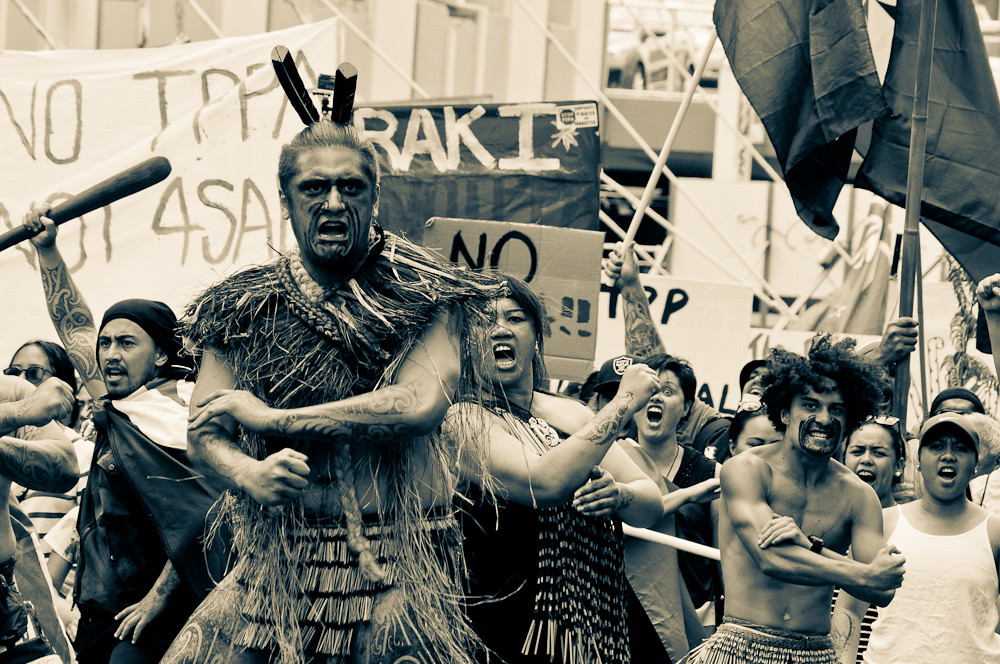NTW on IPEF for Brisbane 10 Dec 2022
NTW on IPEF for Brisbane 10 Dec 2022
Tēnā rā koutou e ngā iwi puta noa. Ko koutou, ko mātou, ko tātou.
E mea ana te kōrero, ‘He kokonga whare e kitea, he kokonga ngākau, e kore e kitea’.
Literally this means, ‘The corners of a house can be seen and examined, not so the
corners of the heart.’
This whakatauki or proverb is a metaphor that encourages people to share their inner
feelings, opinions, beliefs and ideas.
Ngā Toki Whakarururanga is an independent Māori entity committed to advancing and
protecting the rights, interests, duties and responsibilities of Māori in the broadly defined “trade” space.
We are established pursuant to a Mediation Agreement reached in the long-running Waitangi Tribunal inquiry into claims that the Trans-Pacific Partnership Agreement breached the obligations of the Crown (the current New Zealand Government) to Māori under te Tiriti o Waitangi (the Treaty of Waitangi). The claim is known as Wai-2522.
The Mediation Agreement promises to ensure that Māori have genuine and effective influence over every stage of the development of trade policy and conduct of negotiations by Aotearoa New Zealand. That includes IPEF.
Our kaupapa/principles
The kaupapa to which we are accountable, and which is reiterated in the Mediation Agreement, derives from Te Tiriti o Waitangi that was signed by our tupuna (forebears) in 1840 and which is, in turn, based on He Whakaputanga o te Rangatiratanga o Nu Tireni (the Declaration of Independence) which they proclaimed in 1835.
These sacred instruments guarantee Māori will continue to exercise self-determination and self-governance (rangatiratanga) over our people, resources and way of life, while the English settler government exercises delegated authority over its own.
Self-determination includes the international domain of trade policy and negotiations. Our
people have always been traders, based on enduring relationships and values not transactions for commodities. We also carry an enduring obligation as kaitiaki or custodians of the world we have inherited, and of which we are an inseparable part, to protect its wellbeing for future generations. In doing so we seek relationships with other indigenous peoples and non- indigenous who respect our values.
These are the principles we bring to our interaction with the Crown and with other participating states in IPEF.
Our responsibilities
Our leadership is committed to setting a bar that ensures the Crown honours its obligations
under Te Tiriti. This includes input into negotiations from our team of skilled technical advisers to avert and remedy breaches of Te Tiriti in existing agreements (such as digital trade), the conduct of Tiriti o Waitangi assessments of concluded agreements, and Tiriti o Waitangi audits of how the Crown conducted the negotiations.
Our responsibilities also require the empowerment of Māori communities who are affected by trade policy and agreements, including
- coastal fishers and organic growers and larger producers,
- to the health sector and practitioners of traditional medicines,
- the creative sector and Māori workers,
- digipreneurs and small Māori made businesses,
- those with responsibility to protect mātauranga (knowledge), whakapapa (identity), te Taiao (the natural domain), te Reo Māori (language) and other tāonga (gifts from the gods and ancestors).
These and other communities will be impacted upon by almost every pillar of IPEF. We will
therefore be monitoring closely and exercising influence over all those elements.
The paradox of “inclusion”
We want to make it clear that we will not accept being siloed into some chapter on “inclusion” that treats indigenous peoples as just another stakeholder alongside women, labour, small businesses, rural dwellers, disabled people and others. As the United Nations Declaration on the Rights of Indigenous Peoples recognises we have a constitutional authority that includes the right to self-determination.
Nor will we accept a meaning of inclusion that applies only after the fact, having excluded us
from a seat at the negotiating table or even the right to access the texts that purport to
determine our rights, even if we have signed a confidentiality agreement. Inclusion means
having a voice to promote and protect our interests and to challenge proposals that do not in the place the decisions are made.
The Crown’s (New Zealand Government’s) responsibilities
The New Zealand Government with whom you are negotiating on behalf of Aotearoa New
Zealand are fully aware that they may be called to account in the Waitangi Tribunal once again if the processes or the rules they agree to in IPEF breach Te Tiriti o Waitangi. We expect them to ensure that does not occur and we ask you to respect our rights and their obligations from this point onwards in the IPEF process






